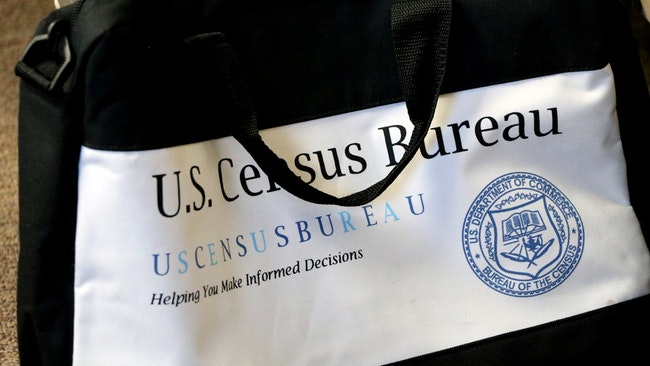
The self-response rate for the census in Oregon was recently about 66%, and the Census Bureau now has one less month to collect the remaining responses in person. (The Enterprise/Yadira Lopez)
ONTARIO – A decision to end the 2020 census a month early could disrupt an accurate count of residents in rural areas such as Malheur County.
The U.S. Census Bureau will stop its count one month earlier than planned based on direction from the secretary of U.S. Commerce Department, according to a statement issued Aug. 3.
Gustavo Morales, executive director of Euvalcree in Ontario, said he is concerned that the decision will cause rural communities to be misrepresented, and that its reduction of local resources will be experienced over the next decade.
In its statement, the Census Bureau said, “Once we have the data from self-response and field data collection in our secure systems, we plan to review it for completeness and accuracy, streamline its processing, and prioritize apportionment counts to meet the statutory deadline. In addition, we plan to increase our staff to ensure operations are running at full capacity.”
The Census Bureau will stop field data collection by Sept. 30 – as opposed to its previous end date of Oct. 31 – to complete the count and apportionment of seats in the U.S. House of Representatives to every state by Dec. 31.
“If anything, they should’ve increased the timeline to allow for more communication to be shared,” said Morales. “When you’re reducing the amount of time, especially in a time where people are in a state of emergency, they’re being reactive to the circumstances.”
Morales said he thinks the decision shows that “the federal government, most of their actions don’t hold the integrity of all the populations that reside within our great nation,” adding that its actions don’t reflect diversity and equity, and rural communities are often under-funded “more than their counterparts.”
“When you combine the actions, all these communities feel like the government is against them. They don’t have confidence that they’ll be safe and I don’t blame them,” he said. “Rural communities are ‘live and let live’ communities and ‘get ‘er done’ communities, so I don’t think rural communities have a sense that the government has been supportive of them, and this isn’t any different.”
To ensure more accurate representation, Morales said people should spread the word “as quickly as possible” to friends and family about the count ending four weeks early and educate them on “the importance of the census, and what it means for the reallocation of our tax dollars and where they need to be invested to ensure we have a sustainable and viable society.”
Sara Montroe, staff attorney at the Oregon Law Center’s Ontario office, said there is important census information related to Covid – such as whether census response rates have been lower than past years – that hasn’t been reported yet.
“My concern is they’re already low because of Covid, then there’s a shorter time period to collect data,” said Montroe.
Many state and federal programs, she said, rely on census data “to look at who’s in the community and what portions of the community are going to need funding for what programs. Just kind of getting a general profile of the community is a big part of funding allocation for a lot of groups.”
In a letter to the U.S. Department of Commerce, Senators Ron Wyden and Jeff Merkley said there are roughly 1.3 million “Hard-to-Count” individuals in Oregon and requested that the collection deadline be “immediately” restored to Oct. 31.
“Without a robust response rate, the Census will be unable to capture these individuals, depriving communities of lifesaving and life changing government resources, including SNAP, housing assistance, Head Start, and fair representation in Congress,” Wyden and Merkley wrote in the letter.
Regarding census data collection during the pandemic, they said, “This collection has faced historic obstacles, and at the same time, our state faces a historic need for resources. Depriving individuals the opportunity to be counted not only undercuts our democracy, but results in the failure to allocate millions of dollars in resources.”
The current self-response rate for the census count in Oregon is 65.6%, the letter stated. The Census Bureau must visit about 56 million addresses nationwide to collect responses in person, according to a statement issued by the bureau on Aug. 11.
The planned follow-ups had been scheduled between May 13 and July 31, but most were rescheduled for Aug. 11 through Oct. 31.
“Failing to extend the deadlines to April 30, 2021 will result in seriously incomplete enumerations in many areas across our country,” according to a statement Aug. 4 from four former U.S. Census Bureau directors.
The people that follow-up was expected to reach will be under-represented as a result, according to the statement, with “even greater rates for traditionally hard-to-count populations and over-representation of all other populations with potentially extreme differential undercounts.”
As of July 30, nearly 40% of U.S. households have not responded to the 2020 census, according to the National State Data Center.
The Census Bureau “must be given the time to accurately count, tabulate, and report the resident population of the country,” the center said in a statement. “Reducing Census data collection to September 30 puts the Census Bureau at risk of failing the Constitutional mandate of the US Census and providing inaccurate data for redistricting and funding to every state, congressional district and community.”
PRIOR REPORTING:
Census work around Malheur County still vital despite virus closures
Census suspends field operations for two weeks
Bilingual Census effort skips Malheur County
News tip? Contact reporter Ardeshir Tabrizian by email at [email protected] or call 503-929-3053.
KEEP THE ENTERPRISE GOING AS OTHERS CLOSE…..
Reader support allows the Enterprise to provide in-depth, accurate reporting that otherwise would not get done. Keeping the community well informed is essential. SUBSCRIBE – $5 a month, automatically. DONATE – to provide additional support.




